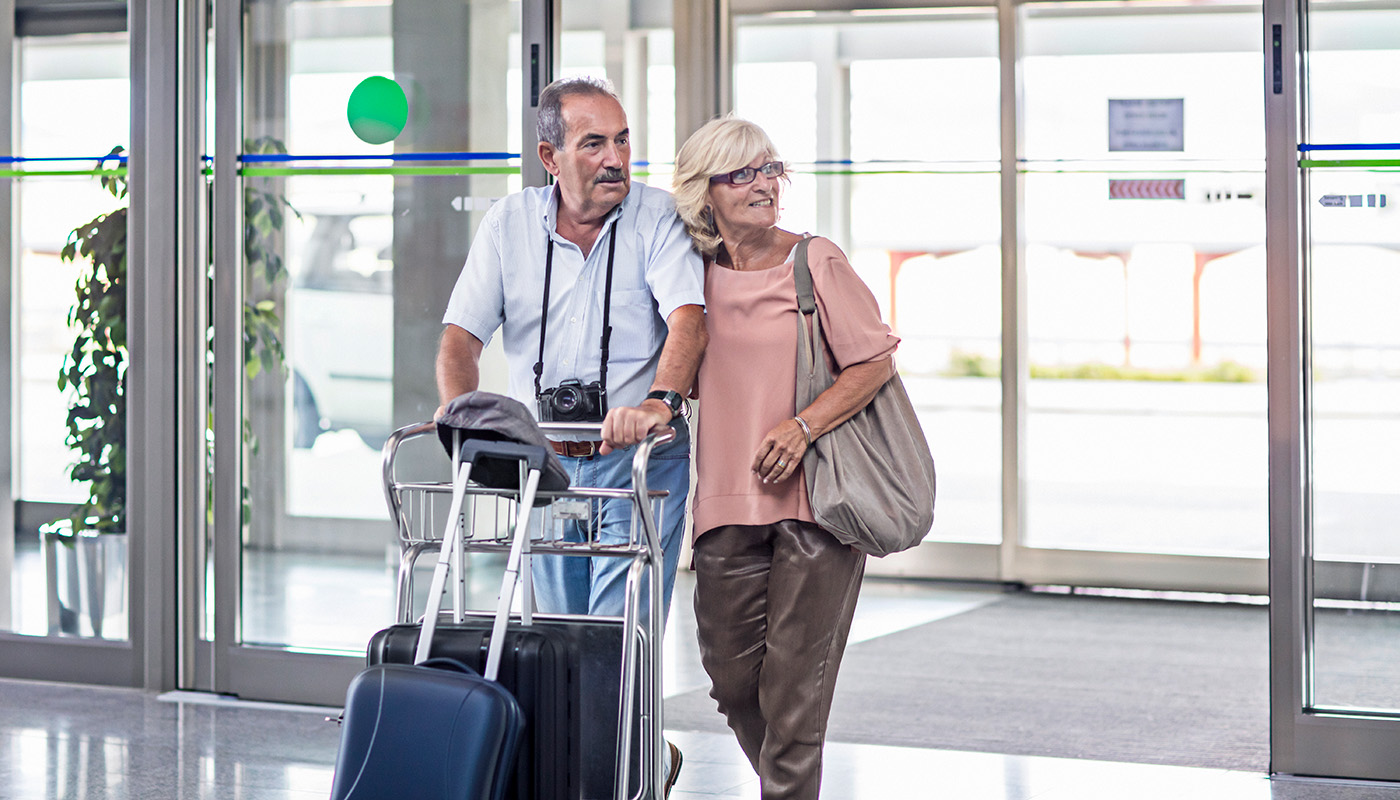15 Travel Tips for Someone With Dementia or Memory Loss
 iStock
iStock
By Barbra Cohn
My husband Morris loved to travel so much that he memorized plane and train schedules for fun— that is, until he developed Alzheimer’s disease. When he was unable to convert dollars into the local currency on our 25th anniversary trip through France and Spain, I realized something was very wrong.
He followed me like a puppy dog around Barcelona and was afraid to hop on the subway. I was forced to read maps (not something I’m great at), and choose where to go and what to see, without any input. It was like traveling with a young child. My suspicion that he had Alzheimer’s was confirmed when we returned home.
That winter we went to an all-inclusive Mexico resort on the Riviera Maya, south of Cancun, to escape from our new reality. The last-minute getaway helped alleviate the stress of worrying about the future. But I couldn’t totally relax, as I quickly learned you can’t trust someone with dementia and disorientation to find their way back to an unfamiliar hotel room.
Morris had been an avid lap-pool swimmer, so on a later trip to Glenwood Springs for a soak in the mineral pools, I was concerned that he would have trouble getting dressed in the locker room without my help. My first question to the staff was, “Do you have a family changing room?”
They actually have two, complete with toilet, sink, shower, and fold-down bench. There are also three ADA (American Disabilities Act)-accessible rooms in the new restroom facility near the kid’s area at the west end of the property.
Changing was easy. But Morris was afraid to get into the pool. I later learned that people with Alzheimer’s disease have difficulty with depth perception and peripheral vision. Their eyes might be healthy, but changes in the brain affect the way they process visual information and alter perception of the world and how they understand it.
I wish I had known this before our family took a trip to Arches National Park. Morris was terrified as we slowly made our way through Devils Garden. And I became impatient with him, not realizing that he probably felt as though he was about to fall off a cliff.
The good news is that you can travel with a loved one who has dementia. It’s a bit of a challenge, but it’s doable in the early stages of dementia. It just takes more planning, patience and time as daily routines will be disrupted. Here’s how to make it easier on yourself, family members and the person you’re caring for.
Tips for helping people with cognitive impairment
- Have an identification bracelet or wearable GPS unit for your care recipient that can’t be easily removed. List the person’s name and your phone number on the ID. If the person can still use a cellphone, make sure your number is the emergency contact.
- Keep a current photo of your care recipient with you in case you get separated and carry a laminated card that briefly explains that they have dementia. Showing this to service people helps to avoid frustration, impatience, confusion and embarrassment.
- For air travel, avoid booking a flight with layovers and instead opt for a direct flight. Limit travel time to under four hours, if possible.
 iStock
iStock
- Carry on your luggage, if possible, to avoid waiting at baggage claim. Carry documents and medications with you.
- Velcro shoes or slip-on shoes are a must. Plus, most airports have a seating area a few feet from where you pick up your belongings where you can put yourselves back together, and just beyond that is a handicapped seating area where you can hitch a ride on an electric cart that brings you to your gate.
 iStock
iStock
- Use the family restrooms, rather than the public restrooms. Your traveling companion will appreciate the help.
- Take advantage of early boarding. This will give you extra time to get settled.
- Let flight attendants know about special needs. They are more than willing to help.
- Bring an iPad or tablet with headphones for entertainment and relaxation.
- Consider staying in a hotel rather than with relatives who may be alarmed by or unfamiliar with dementia patient symptoms. If there’s drama in the household, it will only exacerbate a stressful situation and add to everyone’s confusion and frustration.
- Let the hotel staff know about any special needs
 iStock
iStock
- Bring an aromatherapy diffuser. For some, aromatherapy works like magic to allay anxiety. Put a few drops of lavender oil, sage, geranium, rose, or ylang ylang oil on a pillowcase, handkerchief that you can stick in a shirt pocket, or in a diffuser. Try out different blends before your trip to see what your traveling companion prefers. Essential oils and diffusers are available at natural food stores and online.
- Avoid noisy, crowded situations that might provoke anxiety, fear, or confusion as much as possible. Instead, visit tranquil environments such as art museums and galleries, botanical gardens, and special interest museums. If you’re meeting friends or family, picnic in a beautiful park. If children are included, choose a park with a playground.
- Have afternoon tea, cookies and fruit in your hotel room, and allow extra time for a nap.
- Allow plenty of time for every activity. Try to relax and enjoy your time together.
Following these tips helped when our family took a fun trip to Hawaii with Morris after his health care diagnosis. It was even more special than our previous trips because we wanted to enjoy every precious moment together.
Barbra Cohn is a frequent contributor to EnCompass Magazine and the author of Calmer Waters: The Caregiver’s Journey Through Alzheimer’s and Dementia. Read her blog at barbracohn.com.